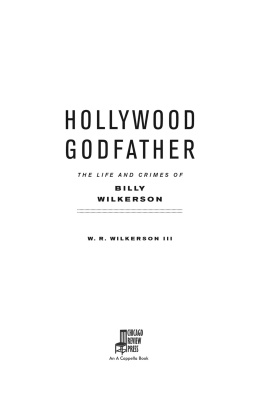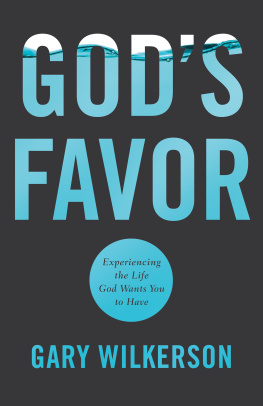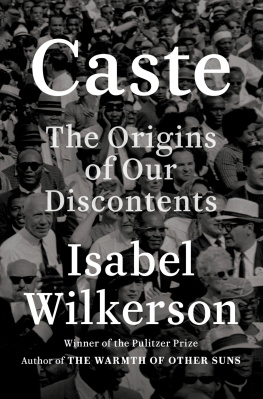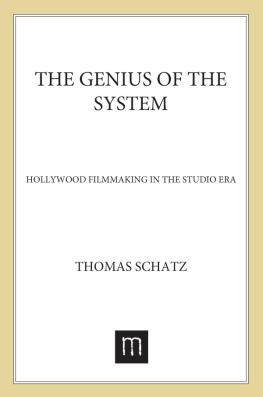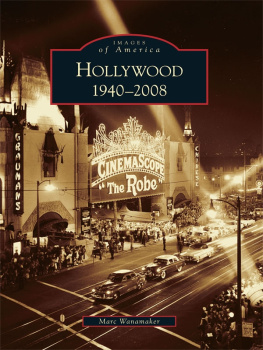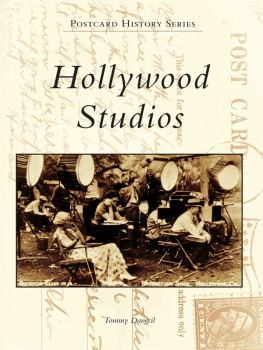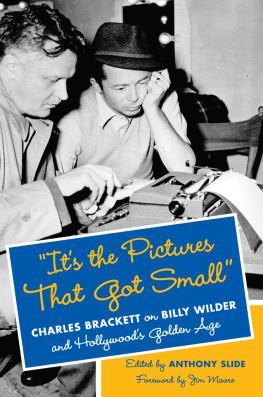Sommaire
Pagination de l'dition papier
Guide
Copyright 2018 by W. R. Wilkerson III
All rights reserved
Published by Chicago Review Press Incorporated
814 North Franklin Street
Chicago, Illinois 60610
ISBN 978-1-61373-660-9
Portions of this book have previously appeared, in substantially different form, in the Los Angeles Times, the Hollywood Reporter, and the authors previous book The Man Who Invented Las Vegas (Beverly Hills, CA: Ciros Books, 2000).
Library of Congress Cataloging-in-Publication Data
Names: Wilkerson, W. R., 1951 author.
Title: Hollywood godfather: the life and crimes of Billy Wilkerson / W. R. Wilkerson III.
Description: Chicago, Illinois: Chicago Review Press Incorporated, [2018] |Includes bibliographical references and index.
Identifiers: LCCN 2018021889 (print) | LCCN 2018028459 (ebook) | ISBN9781613736616 (PDF edition) | ISBN 9781613736630 (EPUB edition) | ISBN9781613736623 (Kindle edition) | ISBN 9781613736609 | ISBN 9781613736609 (cloth edition)
Subjects: LCSH: Wilkerson, Billy, 18901962. | BusinessmenUnited StatesBiography. | Publishers and publishingUnited StatesBiography
Classification: LCC HC102.5.W544 (ebook) | LCC HC102.5.W544 A3 2018 (print) | DDC 647.95793/135092 [B] dc23
LC record available at https://lccn.loc.gov/2018021889
All images are property of Wilkerson Archives
Typesetter: Nord Compo
Printed in the United States of America
5 4 3 2 1
This digital document has been produced by Nord Compo.
This ones for you, Pop...
Never forget a friend. Never forgive an enemy.
Billy Wilkerson
PREFACE
DISCOVERING
MY FATHER
I NEVER KNEW MY father the way most sons know their dadsthe way I wish I had. I was robbed of that opportunity one September morning in 1962, when I was ten years old and my father slipped out of my life forever. He didnt live long enough for the dust from his wings to fall on me, and his death left a void that was never filled and cast a pall over our house that never lifted.
At first, like most kids, I wasnt curious about what his life had been like. I was already carrying so many painful memories of the years with him; for almost my whole life Id watched him suffer from emphysema and dementia. His health battles had seemed titanic and endless. And my preteen mind was preoccupied with other thingsnot the least of which was the appearance less than two years after my father died of the Beatles on The Ed Sullivan Show. The moment I saw that broadcast, I knew what my calling was.
But in 1972, after the dust of rock n roll settled, I began to think more about my dad. I was a freshman at the University of Southern California, and I began to write to the man who many had told me knew Billy Wilkerson better than anyone: George Kennedy, his secretary of thirty years. George had been at my fathers side (or just steps outside his open office door) since 1933, from his early years at the helm of the Hollywood Reporter, as he opened many of Hollywoods most renowned cafs, restaurants, and clubs, and through the whole rest of his life. George had a front row seat to both my fathers business dealings and his chaotic personal life.
It was George himself who had opened the door to our correspondence, sending me a first-edition James Joyce volume signed by his Paris publisher, Sylvia Beach, for my eighteenth birthday. And our relationship was made easier by the fact that George was also my baptismal godfather. When the time came for that Catholic sacramentand my father was always a devout CatholicBilly Wilkerson could have chosen from any number of his famous and powerful friends. He chose his faithful secretary.
George had been living in happy retirement in Ramona, California, following my fathers death. I had not seen him in all those years, but we began to exchange letters, and as we did, my curiosity about my father deepened. When my film history professor at USC gave us an assignment to write a twelve-page typewritten paper on a well-known figure in the entertainment industry, it was a no-brainer. My father had been among the most well-known men in the entertainment industry in his day, and the more I learned about him, the more I wanted to learn. I wrote to George to ask for his help with my research into Billy Wilkersons life. I had no idea, of course, that that paper would ultimately take me on a forty-year odyssey.
From that point on, every Friday after class I climbed into my orange MG roadster and made the two-hour drive from the house just above the Hollywood Bowl that I shared with my girlfriend at the time to Georges home in Ramona, near San Diego. George lived in a modest house filled with an eclectic mix of antiques and signed paintings and photographs, many by the famous photographer Carl Van Vechten. He also lived in what felt to me like a library: every room in his house was filled floor to ceiling with books. At the time of his death decades later, he had more than seventy-five hundred volumes.
For the next several months I spent my weekends drinking in every story George told about my father. We spent early evenings on his veranda, gin and tonics in hand, watching the sunset as George told tales. He was usually uninhibited in his storytelling, despite the fact that he had kept my fathers secrets for thirty years. He was sixty-four that year, and he asked me to please not use a tape recorder; he had a terrible stammer that was exacerbated when he was nervous, and some of the memories were unnerving. I understood, and I got good at listening closely, followed by hours spent writing notes.
Some days when I prodded for information, George was struck mute by the power of his own memories. He would sink into his armchair and dissolve in tears, and for a while he stopped telling stories. There could be no disputing the raw truth he offered me; if for a moment Id imagined he was inventing, when I heard him at night screaming in his sleep, reliving some of the darkness he had witnessed and overheard, I knew he was telling me the unvarnished truth about my father.
One stifling summer night Georges screaming woke both of us. I wandered out to the kitchen in my underwear and T-shirt and found him there. We opened all the windows in the house to let in what little breeze there was, and we made hot chocolate and continued the conversation we had left earlier. Neither of us seemed capable of sleep, so we parked ourselves in the living room. Mindful of the air force of moths and mosquitoes just outside the windows screens, we lit just one light to keep them from invading. We sipped our chocolates and shared a whole pack of Winston filter cigarettes.
That night George was talking about my fathers many wives, the sixth and last of whom was my mother, Tichi. For the first time, he dug out the breakup letter Dad had received from Edith Gwynn, his second wife. She was the partner who had been with him when he first catapulted to success, and she was the one who had stayed on at the Reporter for the next several decades, becoming one of the trade papers best-known writers. George handed me her twelve-page typewritten missive. He wanted me to read it to myself, but I insisted he read it aloud. And so, by the light of that single lamp, he slowly read Ediths letter, which sounded like a cry from the soul.
Ive always believed writing to be a great emotional exorcist. Why there is magic made when we siphon painful memories from our hearts and minds and commit them to the page remains a mystery, but magic I know it to be. And because I knew George carried many demons from those yearsas did so many of those who crossed my fathers pathI encouraged him on many of our late afternoon walks to take up the pen of exorcism. He shied away from the task, but to this day I believe if he had, it would have saved his life. What I know for certain is this: if anyone was qualified to write a book about my father, it was George Kennedy. He was a remarkably gifted writerhe loved wordsand he knew my father inside and out.

